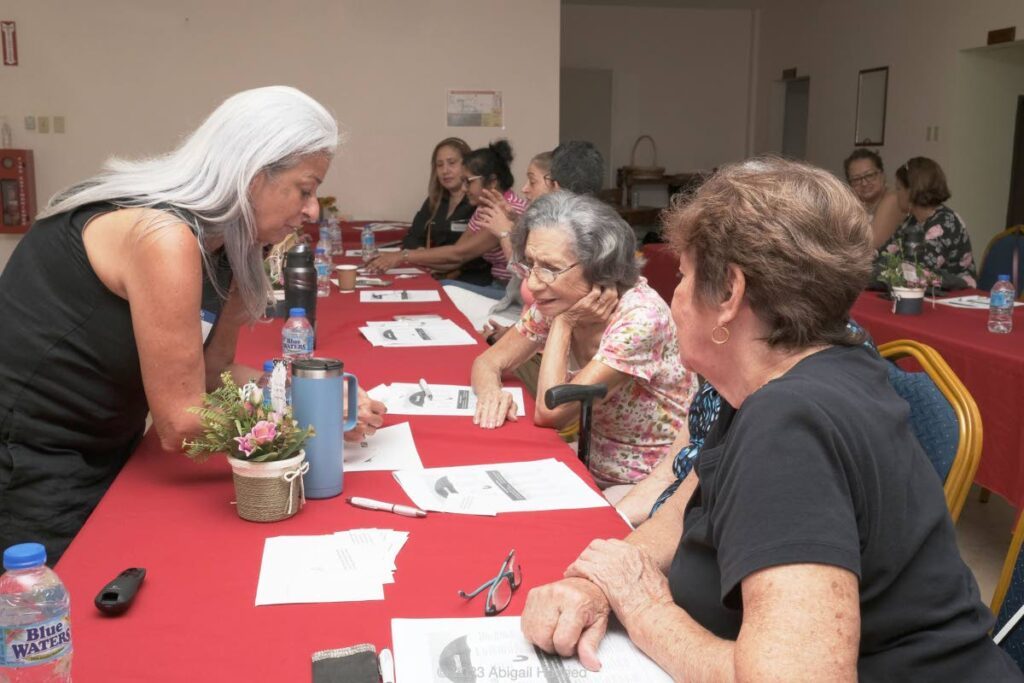US-trained educator to host dementia care workshops

Certified dementia trainer Arlene Correia will be hosting six workshops on caring for people with dementia and at end of life.
The TT-born educator and caregiver said she wanted to help caregivers and families of people with dementia to feel more confident when dealing with them.
Correia said after losing her husband to cancer, she wanted to help people through end of life and support their families. She became a caregiver and certified nursing assistant (CNA) at the Red River Valley hospice in North Dakota in the US 12 years ago. Prior to that, she was a teacher, having gotten a BA in secondary education at the University of Portland, after migrating from Trinidad.
She said she began to research more ways to help people with dementia more appropriately, which led her to dementia care specialist Teepa Snow’s Positive Approach to Care programme, which gave her a strategy specifically geared towards meeting the needs of the person living with dementia.
“I became certified by her organisation as a certified trainer for community education in April 2023. I went to many educational seminars and workshops prior to that and got information on why we might get dementia, what parts of the brain were affected, but no one was giving me information as a caregiver as to what things I could do to encourage someone to get in the shower, for example.”
Correia has done workshops using this method in North Dakota and Minnesota in nursing facilities, assisted living facilities, and hospices. Prior to that she had been doing workshops on end of life since 2019. This is the first time she is doing workshops in TT.
“My sister (Frances) asked me to come and do the workshops. Our mother died in 2018 and if we’d known any of these skills it would have been much easier taking care of her at the end of life. Frances felt like ‘Arlene if you’re doing that there, you should come here and do some.’"
“We’re doing it as a gift to TT because many people are struggling taking care of their family members, and with getting caregivers who have skills that are more than just forcing people to do things. I want to give back.”
Correia said there are both similarities and differences in how both countries deal with people with dementia.
“What is similar is that most people taking care of people living with dementia have not been taught skills that work other than our trial and error. Caregivers are longing to have some hands-on skills in both countries. Also, a lot of family members are involved in taking care of people living with dementia.
“One difference is there are more skilled nursing facilities that are supposedly experts in dealing with people living with dementia in the US than there are here. Another difference is that caregivers and family members here don’t have information to make their jobs more manageable. There’s less of an understanding in TT culture about dementia and we’re more willing to hire unskilled people.”
She said the more skills caregivers and family members develop, the easier it becomes to care for people with dementia.
“No one skill is going to work every single time with a person, so it’s getting us as many tools so we can try and figure out what will work in a given situation, whether someone is not understanding us or not wanting to co-operate with us. The positive approach to care is us trying to figure out what the person’s needs are with their limited communications skills as opposed to following our own agenda. We are looking at what their needs are at a particular time, what their habits used to be, doing things in a way that makes it smoother to care for them.”
Correia said the three-hour workshops are delivered in three parts. In the first segment, participants explore interactively the differences between aging normally and aging with dementia, including brain scans, and learn about what to expect from the aging person in terms of loss of vision, hearing, and mental acuity.
In the second segment, Correia said participants learn about the GEMS brain change model, which explores different stages of dementia, the skills retained, and how to engage people with dementia at each stage.
In the final segment, participants practise approaches that get the attention of people with dementia, Correia said. She uses devices to show people the changes in vision and hearing, and teaches them how to approach the person living with dementia.
“The workshop is suitable for all caregivers, both professionals and family members, as it helps them to understand what’s going on in the patient’s brain. It teaches families about how to start relationships with their loved ones who no longer remember their names. It’s great also for families where there’s conflict about how to deal with the person.”
Correia said many people will have a friend or family member who has dementia, and a consequence is that patients lose their friends, who are uncomfortable interacting with them. She said having these skills means people will become more comfortable visiting the person with dementia, who will also be happy with the company.
“My goal is to help people develop their skills so people enjoy caring for them and the person living with dementia has a calmer day, a day with more good moments, instead of not being understood.”
The workshops cost $150. They will be held at the Barataria Community Centre on October 3, the San Fernando Community Centre on October 4, and the Arima Community Centre on October 5. Participants can attend a session from 9 am-12pm or 1pm-4pm.
For more information visit - https://evolvecaribbean.com/dementia/.

Comments
"US-trained educator to host dementia care workshops"